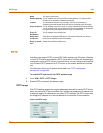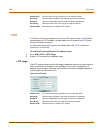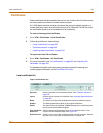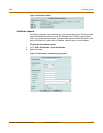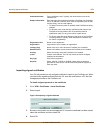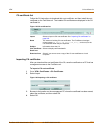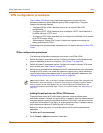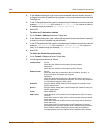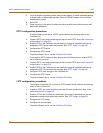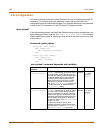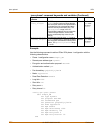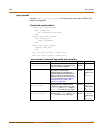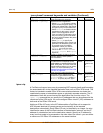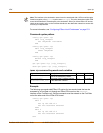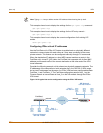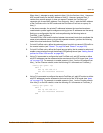
268 01-28007-0068-20041203 Fortinet Inc.
PPTP configuration procedures VPN
3 You may enable a protection profile, and/or event logging, or select advanced settings
to shape traffic or differentiate services. See the “Firewall” chapter of the FortiGate
Administration Guide.
4 Select OK.
5 Place the policy in the policy list above any other policies having similar source and
destination addresses.
PPTP configuration procedures
If the FortiGate unit will act as a PPTP server, perform the following tasks on the
FortiGate unit:
1 Create a PPTP user group containing one user for each PPTP client. See “Users and
authentication” on page 233.
2 Enable PPTP on the FortiGate unit and specify the range of addresses that can be
assigned to PPTP clients when they connect. See “PPTP range” on page 260.
3 Configure the PPTP server.
4 Configure the PPTP clients.
To perform Steps 3 and 4, see the FortiGate VPN Guide.
To arrange for PPTP packets to pass through the FortiGate unit to an external PPTP
server instead, you must:
1 Create a PPTP user group containing one user for each PPTP client. See “Users and
authentication” on page 233.
2 Enable PPTP on the FortiGate unit and specify the range of addresses that can be
assigned to PPTP clients when they connect. See “PPTP range” on page 260.
3 Configure PPTP pass through on the FortiGate unit.
4 Configure the PPTP clients.
To perform Steps 3 and 4, see the FortiGate VPN Guide.
L2TP configuration procedures
To configure a FortiGate unit to act as an L2TP network server, perform the following
tasks on the FortiGate unit:
1 Create an L2TP user group containing one user for each remote client. See “Users
and authentication” on page 233.
2 Enable L2TP on the FortiGate unit and specify the range of addresses that can be
assigned to remote clients when they connect. See “L2TP range” on page 261.
3 Configure the L2TP server.
4 Configure the remote clients.
To perform Steps 3 and 4, see the FortiGate VPN Guide.



